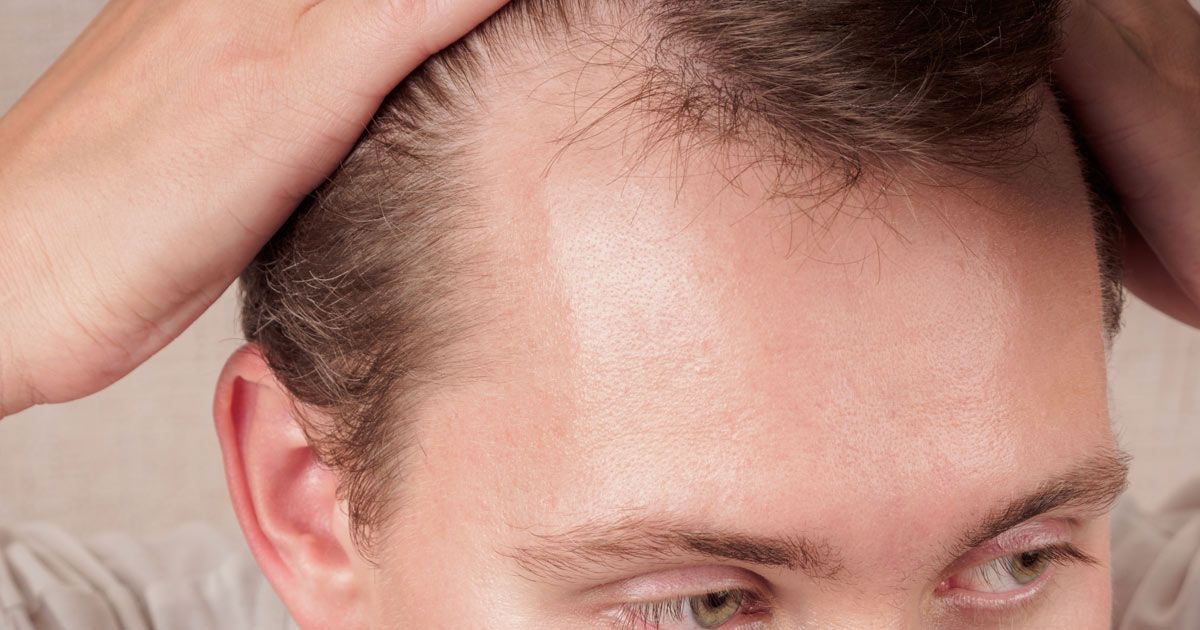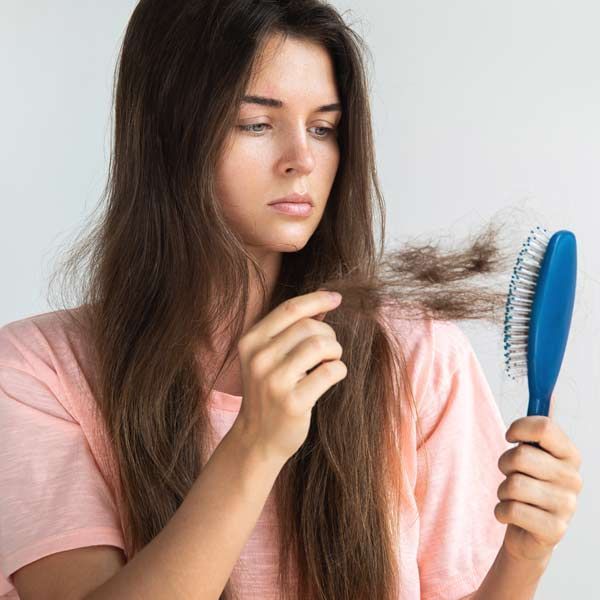Medical Hair Loss Treatments NYC - Dr. John Salerno

Comprehensive and Personalized Hair Loss Therapy by Salerno Wellness in Manhattan, NY, and Connecticut
I understand how distressing hair loss can be and the profound impact it has on your confidence and quality of life. Over my 30 years of experience treating patients, I've witnessed firsthand how hair loss affects not just appearance, but emotional well-being and self-esteem. The good news is that you don't have to accept hair loss as an inevitable part of aging or genetics. Through my comprehensive approach using complementary, functional, and integrative treatments, I can help identify and address the root causes of your hair loss to restore both your hair and your confidence.
-Dr. John Salerno
How Medical Hair Loss is Defined
Hair loss, medically known as alopecia, is a condition where hair falls out from the scalp or other parts of the body at an accelerated rate that exceeds normal hair shedding. The average person naturally loses 50 to 100 hairs per day as part of the normal hair growth cycle, but hair loss becomes a concern when this rate significantly increases or when new hair growth fails to replace what's been lost. This condition can manifest as gradual thinning, patchy bald spots, or complete baldness, depending on the underlying cause and type of hair loss. Hair loss affects both men and women, though it presents differently based on gender, age, and individual factors.
The condition can be temporary or permanent, sudden or gradual, and may involve just the scalp or extend to other body areas. While often associated with aging, hair loss can occur at any age and may be triggered by various factors, including hormonal changes, medical conditions, medications, or physical and emotional stress. The psychological impact of hair loss should not be underestimated, as it often leads to decreased self-confidence, social anxiety, and emotional distress. Understanding that hair loss is a legitimate medical condition that deserves proper evaluation and treatment is the first step toward finding an effective solution.
Common Medical Symptoms of Hair Loss
Hair loss presents through various symptoms that can help identify the underlying cause and determine the most appropriate treatment approach. Recognizing these symptoms early is crucial for successful intervention and prevention of further hair loss. The manifestation of hair loss symptoms varies significantly between individuals and can progress at different rates.
- Gradual Thinning on Top of Head: This is the most common type of hair loss, affecting both men and women as they age, though it typically begins earlier in men. The thinning usually starts at the hairline in men and progresses to form an "M" shape, while women often experience diffuse thinning across the crown of their head.
- Circular or Patchy Bald Spots: These smooth, coin-sized bald patches can appear suddenly on the scalp, beard, or eyebrows and are often associated with alopecia areata. The affected skin may feel itchy or painful before the hair falls out, and in some cases, the patches may expand or multiply over time.
- Sudden Loosening of Hair: This symptom involves hair falling out in larger quantities than normal during washing, brushing, or even gentle tugging. The hair loss is typically diffuse across the entire scalp rather than in specific patterns, often triggered by physical or emotional shock, illness, or medical treatments.
- Full-Body Hair Loss: Some medical conditions and treatments, particularly chemotherapy for cancer, can cause complete hair loss across the entire body. This type of hair loss usually includes eyebrows, eyelashes, and body hair in addition to scalp hair, though it's often temporary.
- Patches of Scaling or Infection: Fungal infections of the scalp can cause hair loss accompanied by scaling, redness, and sometimes broken hair shafts. These infections may also cause the affected areas to become swollen, tender, or oozy, requiring immediate medical attention to prevent permanent hair loss.
Common Causes of Hair Loss
Hair loss stems from a complex interplay of genetic, hormonal, environmental, and lifestyle factors that can affect anyone regardless of age or gender. The most common cause is androgenetic alopecia, also known as male or female pattern baldness, which accounts for 95% of hair loss in men and is increasingly common in women, particularly after menopause. Hormonal fluctuations play a significant role, with conditions such as thyroid disorders, pregnancy, menopause, and polycystic ovary syndrome (PCOS) all capable of triggering temporary or permanent hair loss.
Physical and emotional stress can shock the hair follicles into a resting phase, leading to diffuse hair loss that typically becomes noticeable three to six months after the stressful event. Nutritional deficiencies, particularly of iron, protein, vitamin D, and B vitamins, can significantly impact hair growth and lead to thinning or brittle hair. Certain medications and medical treatments, including blood thinners, antidepressants, blood pressure medications, and chemotherapy, list hair loss as a common side effect.
Autoimmune conditions such as alopecia areata cause the immune system to attack hair follicles, resulting in patchy hair loss that can progress to complete baldness. Excessive hairstyling practices, including tight ponytails, braids, chemical treatments, and excessive heat styling, can cause traction alopecia and permanent damage to hair follicles.
Types of Medical Hair Loss
- Androgenetic Alopecia: This is the most common form of hair loss, affecting up to 50% of people over age 50, caused by genetics and sensitivity to dihydrotestosterone (DHT). In men, it typically presents as a receding hairline and crown thinning, while women experience diffuse thinning across the top of the head.
- Alopecia Areata: An autoimmune condition causing sudden, patchy hair loss in circular areas on the scalp or other body parts. This type can progress to alopecia totalis (complete scalp hair loss) or alopecia universalis (complete body hair loss) in severe cases.
- Telogen Effluvium: A temporary form of hair loss caused by stress, illness, medication, or major life changes that pushes hair follicles into the resting phase. Hair typically begins regrowing within three to six months once the underlying trigger is addressed.
- Anagen Effluvium: Rapid hair loss that occurs during the active growth phase of hair, commonly caused by chemotherapy, radiation, or exposure to toxic chemicals. This type of hair loss is usually reversible once the causative agent is removed or treatment is completed.
- Traction Alopecia: Hair loss caused by repeated pulling or tension on the hair from tight hairstyles, braids, extensions, or chemical treatments. Early intervention can prevent permanent damage, but prolonged traction can lead to irreversible follicle damage and scarring.
- Trichotillomania: A psychological disorder characterized by the compulsive urge to pull out one's own hair from the scalp, eyebrows, or other body areas. Treatment requires both addressing the underlying psychological causes and managing the physical hair loss consequences.
- Scarring Alopecia: A group of rare disorders that destroy hair follicles and replace them with scar tissue, making hair regrowth impossible in affected areas. Early diagnosis and treatment are crucial to prevent further follicle destruction and preserve remaining hair.
Related Medical Conditions That Can Be Treated
Hair loss often serves as a visible symptom of underlying health conditions that require comprehensive medical evaluation and treatment. Addressing these root causes is essential for effective hair loss treatment and overall health improvement. Dr. Salerno's integrative approach allows for simultaneous treatment of hair loss and its associated medical conditions.
- Thyroid Disorders: Both hyperthyroidism and hypothyroidism can cause significant hair loss, thinning, and changes in hair texture. These hormonal imbalances affect the hair growth cycle and can lead to diffuse hair loss across the entire scalp if left untreated.
- Hormonal Imbalances: Conditions such as PCOS, insulin resistance, and adrenal dysfunction can create hormonal environments that promote hair loss. These imbalances often involve elevated androgen levels that shrink hair follicles and shorten the hair growth phase.
- Autoimmune Conditions: Alopecia areata, lupus, and other autoimmune disorders cause the immune system to mistakenly attack healthy hair follicles. These conditions require specialized treatment to suppress the autoimmune response and protect remaining hair follicles.
- Nutritional Deficiencies: Iron deficiency anemia, vitamin D deficiency, and protein malnutrition are common underlying causes of hair loss. Correcting these deficiencies through targeted supplementation and dietary changes often results in significant hair regrowth.
- Scalp Infections: Fungal infections, seborrheic dermatitis, and other scalp conditions can damage hair follicles and prevent healthy hair growth. Treating these infections is crucial for restoring optimal scalp health and hair growth potential.

Candidates for Hair Loss Treatments NYC and CT by Dr. John Salerno
Anyone experiencing hair loss, regardless of age, gender, or severity, can benefit from a comprehensive evaluation and personalized treatment plan designed to address the root causes of their condition. Ideal candidates include individuals who have noticed gradual thinning, sudden hair loss, patchy bald spots, or changes in hair texture and are seeking a natural, integrative approach to treatment. Patients who have tried conventional treatments without success or experienced unwanted side effects from medications often find renewed hope through functional medicine approaches that address underlying imbalances.
Women experiencing hair loss related to hormonal changes during menopause, pregnancy, or due to PCOS are excellent candidates for treatment that focuses on hormonal optimization and nutritional support. Men with androgenetic alopecia who want to explore natural alternatives to pharmaceutical interventions or enhance the effectiveness of conventional treatments through integrative approaches benefit significantly from this comprehensive care model.
Individuals with autoimmune-related hair loss, such as alopecia areata, who require immune system modulation and anti-inflammatory support are ideal candidates for functional medicine treatment protocols. Patients dealing with stress-related hair loss, nutritional deficiencies, or scalp conditions that contribute to hair loss find particular success with treatments that address these underlying factors. Those seeking to optimize their overall health while treating hair loss appreciate the holistic approach that improves hair growth as part of achieving total wellness.
How Conventional Medicine Treats Hair Loss
Conventional medicine typically approaches hair loss with a limited arsenal of pharmaceutical interventions and surgical procedures that primarily focus on symptom management rather than addressing root causes. The most commonly prescribed medications include minoxidil, a topical vasodilator that must be applied daily and only works as long as it's used, with hair loss resuming once treatment stops. Finasteride, an oral medication that blocks DHT production, is frequently prescribed for men but carries risks of sexual side effects and is not suitable for women of childbearing age.
Corticosteroid injections are used for alopecia areata, providing temporary suppression of the autoimmune response but requiring repeated treatments and carrying risks of skin thinning and other side effects. Hair transplant surgery involves moving hair follicles from donor areas to balding regions, but this expensive procedure doesn't address underlying causes and may require multiple sessions with extended recovery periods. Conventional treatments often ignore hormonal imbalances, nutritional deficiencies, and other systemic factors that contribute to hair loss, leading to incomplete or temporary results.
Many patients experience frustration with the limited effectiveness of conventional approaches and seek alternatives that offer more comprehensive solutions. The focus on pharmaceutical interventions frequently overlooks the importance of lifestyle modifications, stress management, and nutritional optimization that can significantly impact hair health and growth potential.
How Dr. John Salerno Treats Hair Loss
My approach to treating hair loss differs fundamentally from conventional medicine by addressing the underlying root causes rather than merely treating symptoms with medications that often provide temporary results. Through comprehensive testing, including detailed hormone panels, nutritional assessments, and immune system evaluation, I identify the specific imbalances contributing to each patient's hair loss condition.
Hormonal optimization forms a cornerstone of my treatment protocol, using bioidentical hormone replacement therapy when appropriate to restore optimal levels of thyroid hormones, sex hormones, and adrenal function that directly impact hair growth. Nutrition plays a crucial role, with targeted supplementation of essential vitamins, minerals, and nutrients that support healthy hair follicle function and the hair growth cycle. I utilize advanced therapies such as platelet-rich plasma (PRP) injections, which concentrate the patient's own growth factors to stimulate dormant hair follicles and improve scalp circulation naturally.
Peptide therapy and growth hormone optimization help restore the cellular environment necessary for robust hair growth and overall scalp health. Stress management techniques, lifestyle modifications, and detoxification protocols address environmental and lifestyle factors that contribute to hair loss and prevent optimal treatment outcomes. My integrative approach combines the best of conventional medicine with functional medicine principles, often incorporating low-level laser therapy, microneedling, and other innovative treatments that work synergistically to maximize hair regrowth potential while improving overall health and vitality.
What Can Happen if Hair Loss is Left Untreated?
Hair loss that goes untreated typically follows a progressive course that worsens over time, with the specific pattern and rate of progression depending on the underlying cause and individual factors. Androgenetic alopecia, the most common form of hair loss, will continue to advance following predictable patterns, with men potentially developing complete baldness on the crown and top of the head, while women may experience significant diffuse thinning across the entire scalp. The psychological impact of untreated hair loss often intensifies as the condition progresses, leading to decreased self-confidence, social withdrawal, and in some cases, depression or anxiety disorders that can significantly affect quality of life and personal relationships.
Underlying medical conditions that contribute to hair loss, such as thyroid disorders, hormonal imbalances, or nutritional deficiencies, will continue to cause systemic health problems beyond just hair loss if left unaddressed. Autoimmune-related hair loss, like alopecia areata, may progress from small patches to complete hair loss on the scalp or entire body, and early intervention is crucial for preventing this progression. Scalp conditions that cause hair loss, including infections or inflammatory disorders, can lead to permanent scarring and irreversible damage to hair follicles if not treated promptly.
The longer hair loss continues untreated, the more difficult it becomes to achieve significant regrowth, as dormant hair follicles may eventually become permanently inactive. Nutritional deficiencies that contribute to hair loss can lead to other health complications, including fatigue, weakened immune function, and increased risk of chronic diseases. Without treatment, the emotional burden of hair loss often compounds over time, affecting professional opportunities, personal relationships, and overall life satisfaction in ways that extend far beyond the physical appearance concerns.
Patient Case Study
Sarah Mitchell, a 42-year-old marketing executive, came to my practice after experiencing significant hair thinning over the previous two years that had progressively worsened despite trying various over-the-counter treatments. She reported increased stress at work, difficulty sleeping, and had noticed her hair falling out in larger amounts during shampooing and brushing. Sarah had also been experiencing irregular menstrual cycles, unexplained weight gain, and persistent fatigue that she attributed to her demanding career.
Initial consultation revealed a family history of autoimmune conditions and thyroid disorders, which prompted comprehensive testing, including complete hormone panels, nutritional assessments, and immune system markers. Laboratory results showed significantly low vitamin D levels, iron deficiency, elevated cortisol, and subclinical hypothyroidism that had been missed in previous routine medical examinations. Her testosterone levels were also elevated, suggesting a hormonal imbalance that was contributing to her hair loss pattern.
Treatment began with bioidentical thyroid hormone optimization, targeted nutritional supplementation including high-dose vitamin D and iron, and adaptogenic herbs to support adrenal function and stress management. Within three months of starting treatment, Sarah reported improved energy levels, better sleep quality, and noticed that her hair was falling out less during washing and styling. PRP therapy was introduced at the four-month mark to stimulate dormant hair follicles and accelerate regrowth in areas of significant thinning.
By month six, Sarah's hair density had visibly improved, with new growth evident at her hairline and crown, and she reported feeling more confident and energetic than she had in years. Follow-up testing showed normalized hormone levels, optimal vitamin D status, and improved cortisol patterns, demonstrating the success of addressing root causes rather than just treating symptoms.
Why Patients Choose Dr. John Salerno for Hair Loss Therapy
Patients choose my practice because they recognize that effective hair loss treatment requires addressing the whole person rather than simply applying topical solutions or taking medications that only mask symptoms. My 30 years of experience in functional and integrative medicine have earned me a reputation for achieving remarkable results by identifying and treating the root causes of hair loss that other physicians often overlook.
Unlike conventional approaches that rely heavily on pharmaceutical interventions with potential side effects, my treatment protocols emphasize natural, bioidentical therapies that work with the body's inherent healing mechanisms to restore optimal hair growth. Patients appreciate my comprehensive diagnostic approach that includes extensive testing to uncover underlying hormonal imbalances, nutritional deficiencies, and other systemic factors contributing to their hair loss condition. The personalized treatment plans I develop are tailored to each individual's unique biochemistry, lifestyle, and health goals, ensuring optimal outcomes and sustainable results.
My integrated approach combines cutting-edge therapies like PRP and peptide treatments with time-tested nutritional and hormonal optimization strategies that address hair loss while improving overall health and vitality. Patients value the detailed attention and ongoing support they receive throughout their treatment journey, with regular monitoring and adjustments to ensure continued progress and optimal results. The success stories and testimonials from previous patients demonstrate the effectiveness of my approach and give new patients confidence in seeking comprehensive solutions to their hair loss concerns.
Summary
Hair loss is a complex medical condition that affects millions of people and can significantly impact quality of life, self-confidence, and emotional well-being. Understanding that hair loss often reflects underlying health imbalances is crucial for achieving effective, long-lasting treatment results. Through my comprehensive functional medicine approach, I address the root causes of hair loss, including hormonal imbalances, nutritional deficiencies, autoimmune dysfunction, and other systemic factors that conventional medicine often overlooks.
My treatment protocols combine advanced therapies like PRP injections and bioidentical hormone optimization with targeted nutritional support and lifestyle modifications to restore optimal hair growth naturally. The integrative approach I use not only promotes hair regrowth but also improves overall health, energy levels, and vitality, providing patients with benefits that extend far beyond cosmetic improvements.
Contact Dr. John Salerno to Learn More About Hair Loss Treatments in NYC and CT
Early intervention is key to preventing progressive hair loss and maximizing regrowth potential, making prompt evaluation and treatment essential for optimal outcomes. If you're experiencing hair loss of any type or severity, I encourage you to schedule a comprehensive consultation to explore how my personalized treatment approach can help restore your hair and confidence.
Contact Salerno Wellness today to begin your journey toward healthier, fuller hair and improved overall well-being through natural, effective treatments tailored specifically to your unique needs.
Please contact us today.
Additional References
- Male Androgenetic Alopecia - National Library of Medicine
- Hair Loss - MedlinePlus Medical Encyclopedia



